Introduction:
Are you aware that a mere 29% of students in grades 6 to 12 feel that their school environment fosters encouragement? Holistic education recognizes that every child is a unique individual with diverse strengths, interests, and needs. It emphasizes the development of the whole child—intellectual, emotional, social, physical, and spiritual aspects. By providing a comprehensive learning experience, holistic education enables students to flourish in all areas of their lives, fostering a deep sense of self-awareness and self-actualization.
Why is it crucial for students to feel encouraged and empowered in their educational setting?
The answer is simple: when students receive social and emotional support, their academic performance improves significantly.
Traditionally, standardized testing has been the primary means of evaluating student learning outcomes yearly. However, it is worth considering that these tests only assess the academic knowledge students are expected to acquire within a specific timeframe.
But what about other crucial Quality Education qualities that define a child’s greatness? Unfortunately, standardized tests fail to measure creativity, empathy, generosity, and numerous other essential traits contributing to a child’s holistic development.
If you want to unlock your child’s full potential and provide them with a well-rounded education. Our comprehensive guide will enlighten you about the advantages of this approach and how it can positively impact your child’s growth and success.
Don’t limit your child’s education to a narrow focus on academics. Embrace the power of holistic education and witness its transformative impact on your child’s overall development.
Holistic Education:
In essence, holistic education considers the whole person, embracing their unique needs, talents, and interests. Creating a supportive and engaging learning environment nurtures students‘ intellectual, emotional, physical, and spiritual well-being, enabling them to become well-rounded individuals who actively contribute to their communities.
This approach acknowledges that each child is unique with distinct needs and talents and recognizes that optimal learning occurs when these individual needs are addressed.
Benefits of Holistic education:
When schools embrace this Holistic approach, several benefits emerge:
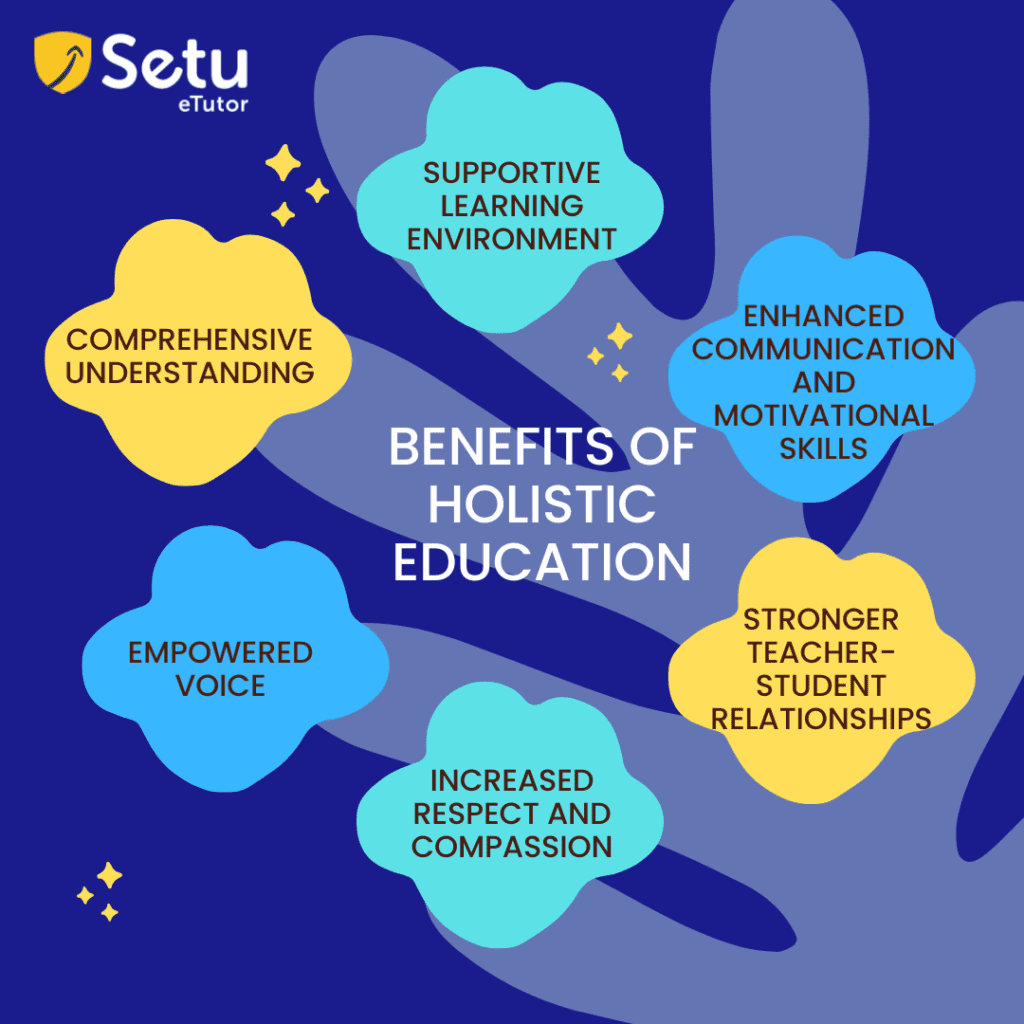
- Supportive Learning Environment: In a holistic classroom, students feel supported, allowing them to focus on learning how to learn. They can actively seek and apply knowledge and are more likely to ask questions when they need clarification.
- Enhanced Communication and Motivational Skills: Holistic education fosters the development of effective communication and motivational skills. Students gain confidence, leading to improved academic achievement and a willingness to engage in the learning process.
- Stronger Teacher-Student Relationships: Embracing a holistic approach promotes better relationships between students and their teachers. This positive rapport creates a nurturing community where students feel valued and understood, positively impacting their overall well-being and academic success.
- Increased Respect and Compassion: Holistic education cultivates respect and compassion for others by encouraging students to understand and appreciate diverse perspectives. Students develop empathy and better understand the world and its diversity.
- Empowered Voice: In a holistic environment, students can voice their needs and seek help when necessary. They learn to recognize areas where they require support and actively seek assistance from teachers and peers.
- Comprehensive Understanding: Holistic education expands beyond traditional subject content, integrating speaking, interacting, and listening into teaching practices. This approach enables students to comprehensively understand the topics they learn and relate positive experiences to their education.
When your child attends a school that embraces holistic education, you can expect to see the following positive outcomes:
- Improved relationships with teachers and the school community
- Increased confidence in academic abilities
- Heightened respect and compassion for others
- Enhanced communication and motivational skills
- A deeper understanding of the world and its diversity
Methods to foster a holistic learning culture
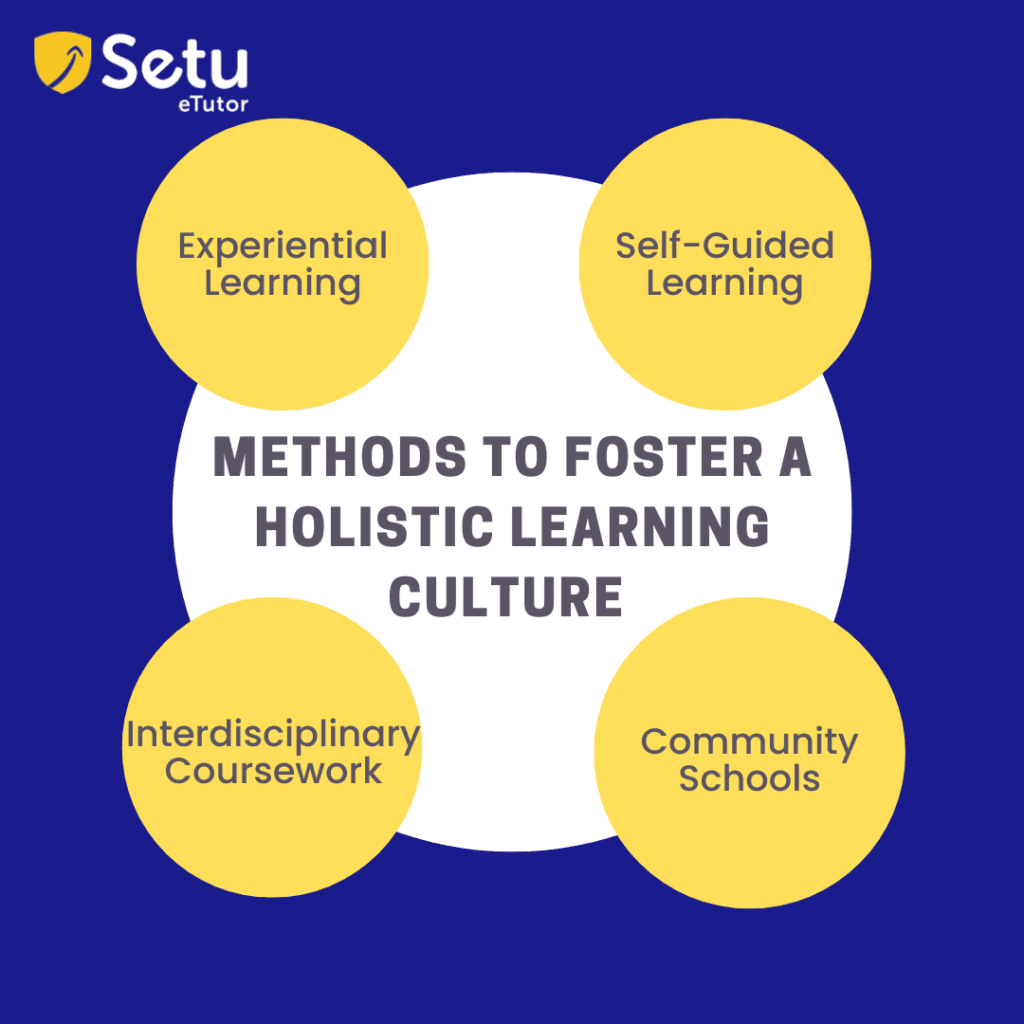
Holistic education aims to nurture a child’s physical, emotional, moral, psychological, and spiritual aspects, fostering personalized opportunities based on their abilities and emotions. Lessons take place in a secure and supportive environment, encouraging students to utilize their unique strengths. Teachers must be prepared to cater to diverse educational levels and learning capacities. While holistic education follows a single philosophy, teachers employ various methods and strategies to foster a holistic learning culture.
Experiential Learning: Schools that focus on experiential learning offer hands-on educational experiences, such as group work to explore effective learning styles and problem-solving exercises for community issues or innovation.
Self-Guided Learning: Students learn at their own pace and style in self-guided environments, mitigating one-size-fits-all models. Low-stakes assessments adapt content and pace, with diverse classrooms of varying ages and abilities.
Community Schools: These schools emphasize community connections, partnering with residents, organizations, and officials to provide support and expanded learning opportunities, including after-school programs.
Interdisciplinary Coursework: Holistic education integrates multiple subjects through thematic courses taught by teachers from different disciplines. It may involve independent research, travel, fieldwork, and internships.
How Holistic Learning Supports Others:
- Teachers in a traditional classroom focus on covering state standards, with limited parent communication unless issues arise.
- However, parent and community involvement is integral to the learning process in a holistic setting, with events like literacy nights and community field trips.
- Such engagement supports the overall development of students, not just their academics. While learning content remains essential, holistic education recognizes the significance of addressing the mental well-being of children, often overlooked or misdiagnosed.
- By embracing students’ mental health and fostering problem-solving skills, holistic education prepares them for a successful transition into adulthood.
How Setu helps your child in improving holistic education?
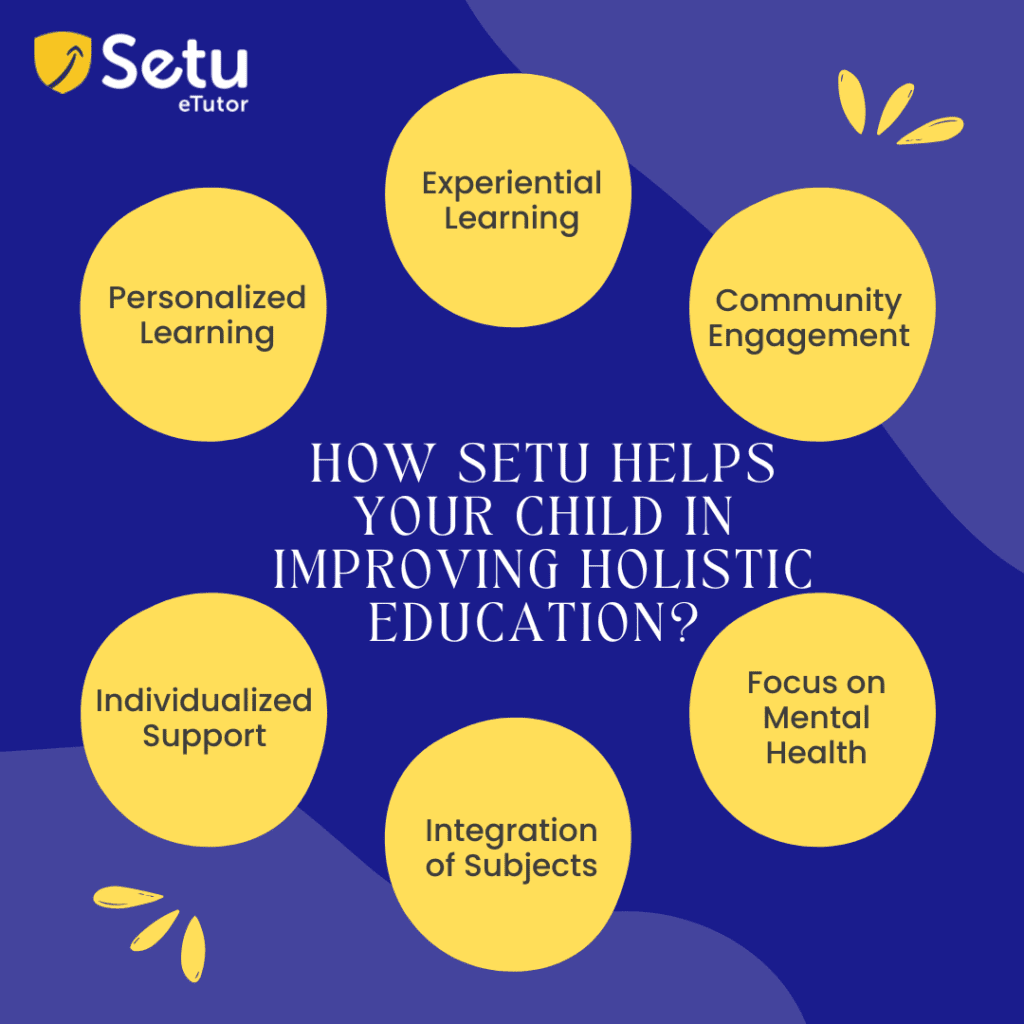
SETU helps improve holistic education for your child in several ways:
- Personalized Learning: SETU offers personalized learning opportunities tailored to the child’s skills, interests, and needs. This approach ensures that their unique strengths are recognized and nurtured, allowing them to thrive academically and personally.
- Experiential Learning: SETU’s emphasis on hands-on and experiential learning methods, including quizzes, student connect, practice and preparation tests, and problem-solving exercises, aims to provide students with a holistic educational experience. By actively participating in these activities, students not only acquire theoretical knowledge but also develop practical skills, critical thinking abilities, and a deeper understanding of the subjects they study.
- Community Engagement: SETU actively involves parents, community members, and organizations in learning. This partnership fosters a supportive and collaborative Learning where students benefit from various perspectives, experiences, and resources outside the classroom. Community events and field trips further enhance their learning experiences.
- Focus on Mental Health: SETU recognizes and prioritizes the mental well-being of students. Teachers are trained to address and support students’ mental health needs, providing guidance, counseling, and creating a safe space to express their emotions and develop coping strategies.
- Integration of Subjects: SETU promotes interdisciplinary learning, where subjects are interconnected and taught. This approach allows students to understand and explore complex issues from multiple perspectives, promoting critical thinking, creativity, and a holistic understanding of the world.
- Individualized Support: SETU ensures teachers are prepared to cater to students with varying educational levels and learning capabilities. They provide individualized support and guidance, fostering a positive and inclusive learning environment where every child feels valued and supported.
Conclusion:
At SETU, we prioritize the holistic approach to education for our students, recognizing the significance of their individual circumstances and surroundings.
Our curriculum is carefully designed by experts to cater to each student’s unique needs. By embracing this holistic approach, we not only foster academic progress but also cultivate important values like respect, resilience, and responsibility..
Additionally, our AI-based tracking system helps identify any potential challenges students may face, enabling us to provide the necessary support and guidance. Through our commitment to holistic education, we aim to nurture the whole child and empower them to realize their full potential. Contact us today to schedule a demo and discover how our platform, SETU, effectively implements holistic approaches to education.

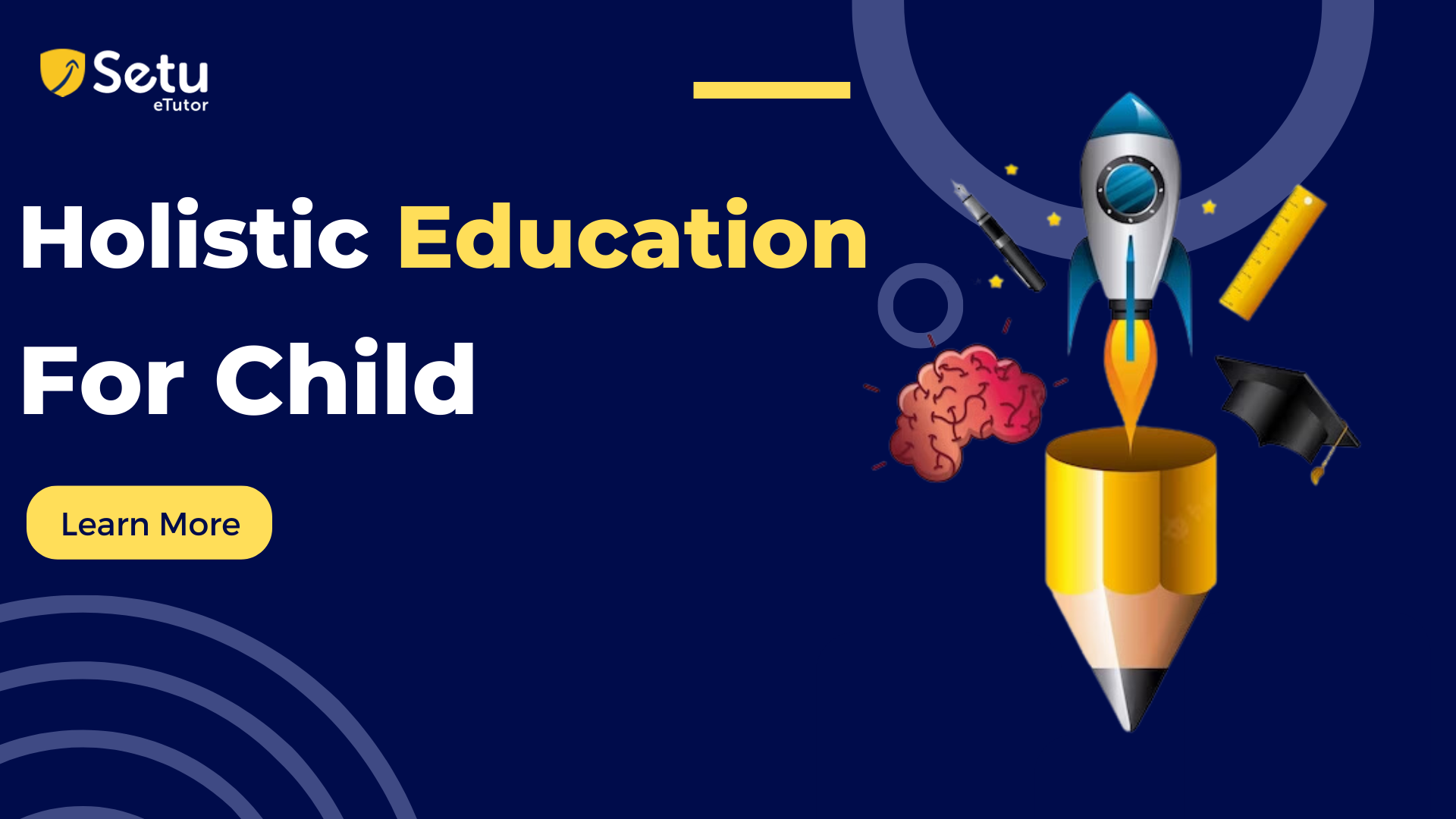


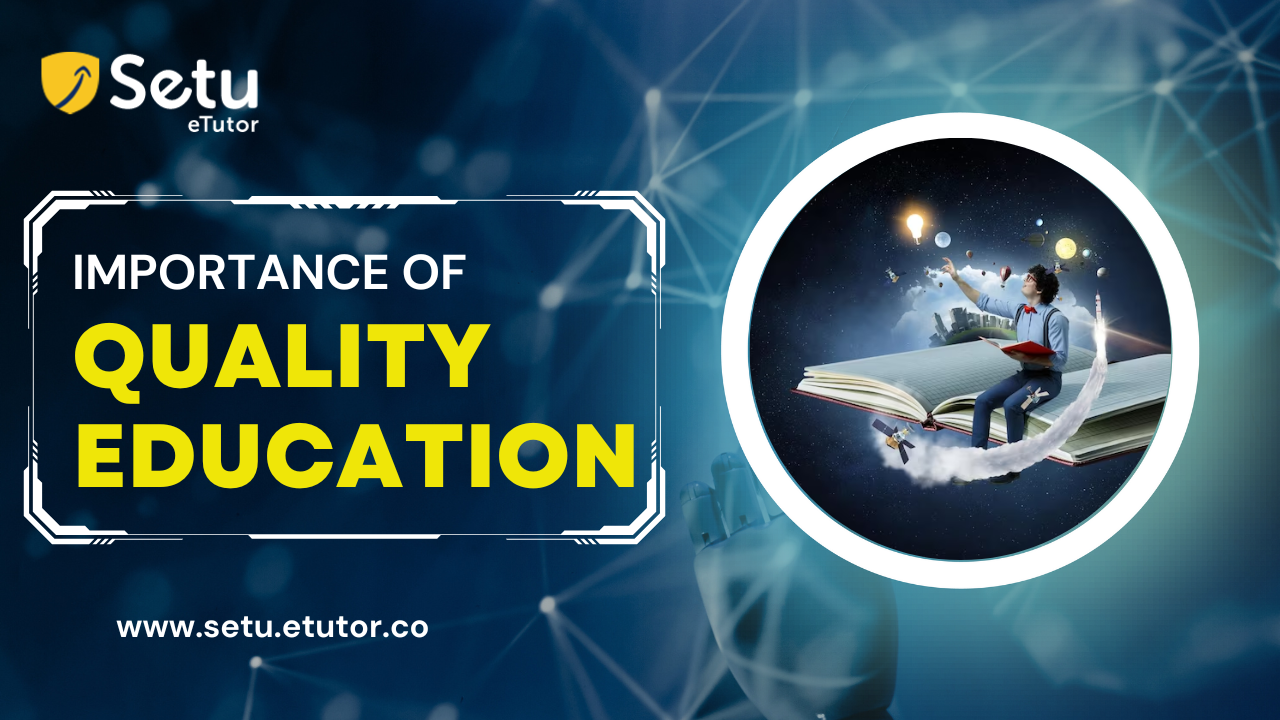
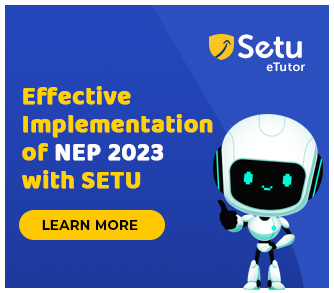
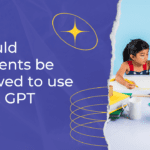


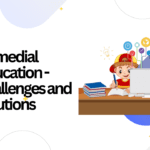
Leave a reply